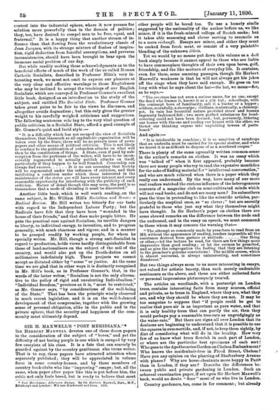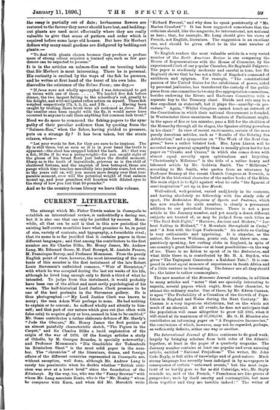SIR H. MAXWELL'S "POST MERIDIANA."•
Sin HERBHRT MAXWELL devotes one of these dozen papers to the consideration of the subject of " bores," and yet the difficulty of not boring people is one which is escaped by very few essayists of his class. It is a fate that can scarcely be guarded against by the country gentleman who turns writer. That is to say, these papers have attracted attention when separately published ; they will be appreciated in volume form in some country-houses, and by those members of country book-clubs who like "improving" essays ; but, all the same, when paper after paper like this is put before him, the critic not only feels bored, but is ready to believe that most • Post Meridiarra : Afternoon Essays. By Fir Herbert Maxwell, Bart, M.P., Idinburgh and London: Wil jam W.ackwood and Foss. 1955.
other people will be bored too. To use a homely simile suggested by the nationality of the author before us, we like
mince, if it is the fresh-minced collops of Scotch cooks; but it takes able seasoning and clever serving to reconcile us to a mere rechauffi. Essays are mince, and either they must
be cooked from fresh meat, or consist of a very palatable
blending of the unknown debris.
Yet we would by no means put down this volume as a dull book simply because it cannot appeal to those who are liable to have commonplace thoughts of their own upon bores, golf, friendship, and the like matters of everyday life. It contains,
even for them, some amusing passages, though Sir Herbert Maxwell's weakness is that he will not always get his jokes off the stage when they have said enough. He goes on too long with what he says about the hat—the hat, we mean—for,
as he says,—
" The cre dun has not even a serious name, for no one, except the fiend who frames it, knows it as a silk bat ; schoolboys, with the contempt born of familiarity, call it a buster or a topper ; soldiers, scornfully, a stovepipe ; civilians, realistically, a chimney. pot. In vain has bountiful nature provided straw and human ingenuity fashioned felt : two more perfect substances for head- covering could not have been devised ; but, perversely, littering our horses with the one and roofing our houses with the other, we thrust our thinking organs into unyielding towers of paste- board."
And again:— " It is intolerable in sunshine ; it is so sensitive of raindrops that an umbrella must be carried for its special shelter, and when wo travel it is as difficult to dispose of as a murdered corpse."
There is plenty of the same agreeably written common-sense in the author's remarks on clothes. It was an essay which was " talked of " when it first appeared, probably because there are many people who try to read the expensive monthlies for the sake of finding material for " intellectual conversation," and who are much relieved when there is a paper which they really can understand. By the way, have many of our more real readers watched the curious influence of the heterogeneous contents of a magazine club on semi-cultivated minds which will not read books, and do not see many men ? Its subscribers pass the time in pretending to like the scientific articles, par- ticularly the sceptical ones, as " so clever ;" but are secretly grateful to those who just say what they themselves might have thought. In Sir Herbert's paper on clothes there are some shrewd remarks on the difference between the nude and the undressed, and in the essay on speech, we must commend to those whom it may concern the warning tbat-
" The attempt so commonly made by preachers to read from an MS. without the appearance of reading, renders impossible all the assistance derived from gesture or attitude One thing or other,—let the lecture be read, for there are few things more impressive than good reading ; or let the sermon be preached, and so give the congregation the feeling that they are listening to the preacher's genuine convictions ! The middle course, which is almost universal, is always uninteresting, and sometimes disastrous."
But two things always seem to us more interesting in essays, not valued for artistic beauty, than such merely undeniable
sentiments as the above, and these are either collected facts or personal impressions picturesquely treated.
The articles on woodlands, with a postscript on London trees, contains interesting facts from many sources, official and private, as to trees in England, where they are, what they are, and why they should be where they are not. It may be too sanguine to suppose that "if people could be got to realise that pure air is as important as pure water, and that it is only healthy trees that can purify the air, then they would perhaps pay a reasonable tree-rate as ungrudgingly as the water-rate." But there are signs all over London that its denizens are beginning to understand that it is possible to use the squares in sum mertide, and, if not, to keep them sightly, by dint of considering what will do in the locality. How very few of us know what trees flourish in each part of London, or where are the particular best specimens of each sort ! Who goes to the Apothecaries Garden on Chel sea Embankment? Who knows the maidenhair-tree in Flood Street, Chelsea? Have you any opinion on the planting of Shaftesbury Avenue with planes ? Why are horse-chestnuts more happy in Paris than in London, if they are ? Describe the differences be- tween public and private gardening in London. Such an arboreal examination paper, if set upon Sir Herbert Maxwell's book, would no doubt " floor " most of us who live in London.
Country gardeners, too, come in for comment ; but already
the essay is partially out of date ; herbaceous flowers are restored to the favour they never should have lost, and bedding- out plants are used most effectually where they are really valuable to give that sense of pattern and order which is required before some large old houses. But here Sir Herbert defines why many small gardens are disfigured by bedding-out plants:— "To deal with plants chosen because they produce a profuse mass of strong colour requires a trained eye, such as few gar- deners can be expected to possess."
It is in the articles on salmon-flies and on trouting tattle that Sir Herbert is most interesting. There he is personal. His cariosity is excited by the ways of the fish be pursues, and he writes at first hand of the trout of his own lake. He discredits the existence of the Salmo Feroz ; one day,— " Ifferox were not wholly apocryphal I was determined to get
on terms with one of them We landed five fish before dinner, the two largest falling to the schoolboy's rod, greatly to his delight, and with mitigated reflex action on myself. These fish
weighed respectively 17t, 8, 5, 21, and 21b Having been caught by trolling, these trout were all reckoned as ferox. Had the smaller ones been caught with the fly, it would never have occurred to anyone to call them anything bat common loch trout."
Need we do more to commend the fishing-papers to the sym- pathy of their peculiar audience than by quoting from the "Salmon-flies," when the fisher, having yielded to pressure, puts on a strange fly P It has been taken, but the strain relaxes, when— "Let your words be few, for they are sure to be impious. The fly is still there, but as soon as it is in your hand the truth is apparent—the steel has snapped behind the barb. Ah ! that was a fish, 30 lbs. if he was a pennyweight—for you caught eight of the gleam of his broad flank just before the direful moment. Sharp as is the tooth of ingratitude, grievous as is the chill of shattered fortune, and the anguish of love betrayed, these are pangs which time touches mercifully into painless scars, but ever, as the years roll on, will you mourn more deeply over that irre- parable moment, ever will the potential weight of that salmon mount up, and your grandson will hearken with dilated eyes to the story of how you lost that 50-pounder."
And so to the country-house library we leave this volume.



































 Previous page
Previous page